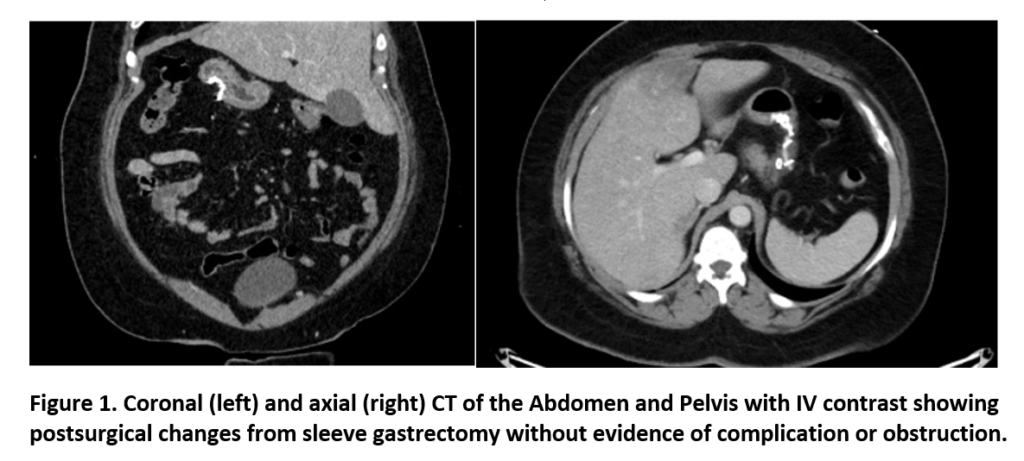Please view the October 2021 Case of the Month below:
The New THC in Town: Cannabinoid Hyperemesis Syndrome Secondary to Delta-8 THC Use
Submitted by:
Jeffrey Rosenthal
Medical Student, Class of 2022
Emory School of Medicine
Manpreet Malik, MD
Assistant Professor
Division of Hospital Medicine
Emory Department of Medicine
Case
A 38-year-old female with a past medical history of sleeve gastrectomy presented with a five day history of intractable nausea and vomiting. Her vital signs were normal. Her abdomen was diffusely tender to palpation without rebound or guarding. Urine drug screen was positive for cannabinoids and opioids; her labs were otherwise unremarkable. She reported receiving tramadol from an outside hospital but stopped taking it 3 days prior to presentation. Given her history of sleeve gastrectomy, a CT Abdomen and Pelvis with IV contrast was ordered to rule out an obstructive process. The scan showed postsurgical changes from the operation (Figure 1).
Initial management included isotonic fluids and intravenous ondansetron. The UDS results prompted further questioning with regards to cannabinoids. The patient added that for the past month she had been using delta-8 THC chewable gummies as a sleep aid most nights of the week.
What is the diagnosis?
Cannabinoid hyperemesis syndrome, due to the patient’s recent use of THC gummies. She was treated with topical capsaicin cream and 5mg haloperidol IV with near immediate relief of symptoms. Within an hour, she was able to tolerate PO and was discharged after recommending cessation of cannabis use. EMR follow up showed no further visits for similar symptoms.
Discussion
Cannabinoid hyperemesis syndrome (CHS) is characterized by cyclic vomiting associated with chronic, high dose cannabis use. The mechanism is poorly understood but is likely due to a complicated disequilibrium of the hypothalamic-pituitary axis and altered gastrointestinal motility. While cyclic vomiting has generally been seen with chronic cannabis use, acute intoxication may be sufficient to induce emesis.1 The primary psychoactive component of cannabis is delta-9 THC, and the primary non psychoactive component is cannabidiol. A slightly less potent component of new cannabis products is delta-8 THC, a double bond isomer of delta-9 THC.2 Delta-8-THC is chemically more stable than its counterpart and similarly displays partial agonist effects on cannabinoid receptors. The clinical differences between the THC isomers have yet to be reported.
Cannabis paradoxically acts as an antiemetic agent at low doses, but has shown to be hyperemetic at high doses. Delta-8 THC has been used in medical settings as an antiemetic in cancer patients undergoing chemotherapy.3 The hyperemetic activity of delta-8 THC has been demonstrated in animal models, but, to our knowledge, there are no known reports of pure delta-8 induced CHS in humans.1 In Georgia and many other states, delta-8 THC containing products can, of recent, be legally purchased. Given the relatively benign exam, negative laboratory workup, negative CT scan, and lack of response to typical antiemetics, we are confident in the diagnosis of CHS.
The only definitive treatment for CHS is cessation of cannabis use. Initial recommendations include IV rehydration and standard antiemetics. Off label uses of haloperidol, benzodiazepines, and topical capsaicin cream may be recommended.4 While a relatively new diagnosis, we believe the incidence of CHS will likely continue to increase due to the popularity of these new products.
Citations
- Darmani NA. Cannabinoid-Induced Hyperemesis: A Conundrum-From Clinical Recognition to Basic Science Mechanisms. Pharmaceuticals (Basel). Jul 7 2010;3(7):2163-2177. doi:10.3390/ph3072163
- Chan-Hosokawa A, Nguyen L, Lattanzio N, Adams WR. Emergence of Delta-8 Tetrahydrocannabinol (THC) in DUID Investigation Casework: Method Development, Validation and Application. J Anal Toxicol. Mar 23 2021;doi:10.1093/jat/bkab029
- Abrahamov A, Abrahamov A, Mechoulam R. An efficient new cannabinoid antiemetic in pediatric oncology. Life Sci. 1995;56(23-24):2097-102. doi:10.1016/0024-3205(95)00194-b
- Stumpf JL, Williams LD. Management of Cannabinoid Hyperemesis Syndrome: Focus on Capsaicin. J Pharm Pract. Jul 2 2020:897190020934289. doi:10.1177/0897190020934289
Acknowledgements
- Victoria Earl, MD
- Marshall Howell, MD



Be the first to comment on "Faculty Development Case of the Month: October 2021"